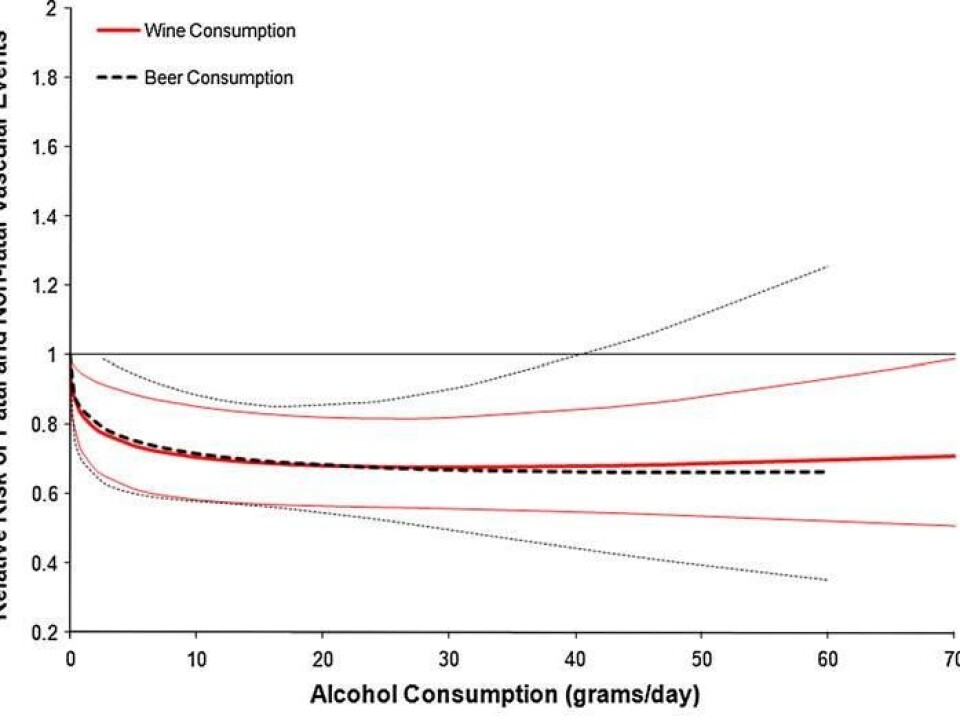
Three beers a day keep the doctor away
Middle-aged and elderly people can now swap their daily glass of red wine with a cold beer without worrying about their health.
Beer makes you fat and unhealthy.
That’s a common conception of the golden drops of hoppy goodness.
However, new research indicates that this is not actually the case – good health just might be hidden at the bottom of a beer glass.
Contrary to the common view, beer has lots of health benefits that make it at least as healthy as wine when it’s consumed in small amounts. Moderate consumption can mean as much as three glasses a day, when paired with a healthy diet.

Along with its many other virtues, beer can help prevent cardiovascular diseases, diabetes and high blood pressure.
These are just a few of the conclusions from the recent international conference ‘Beer and Nutrition’, hosted by the University of Copenhagen.
The health benefits of beer
The scientists participating in the conference listed the following benefits of beer drinking:
- It prevents cardiovascular disease in men over the age of 35 and women over the age of 45.
- Moderate alcohol consumption lowers the risk of diabetes, while large consumption or no consumption increases the risk.
- Beer can lower the risk of osteoporosis, especially in women who have passed menopause.
- Hops contain a number of nutrients that appear to prevent a variety of diseases, including Alzheimer’s disease, obesity and depression.
How to drink beer the healthy way

According to the scientists, drinking beer is beneficial to health if the consumer sticks to the following guidelines. He or she must:
- Drink in moderation, i.e. one to three units a day in conjunction with a healthy meal. Men are allowed up to three units.
- Maintain a consistent intake, spreading the consumption over the entire week.
- Not be young
- Adhere to the current guidelines which dictate a maximum of 14 units a week for women and 21 units a week for men
- Avoid drinking more than five units in a short space of time, for instance in a single night.
Scientists disagree on the recommended daily intake
Opinions differ somewhat when scientists and health organisations discuss exactly how much alcohol constitutes a healthy consumption.
Professor Ramon Etruch of the university hospital in Barcelona argued that as much as three beers a day could be beneficial to men’s health.
However, Per Brændgaard, an MSc in human nutrition, is of a different opinion. He recently republished a report on the most significant aspects of the scientific literature about beer and health. The report (available in Danish only) gathers facts, advice and guidelines about beer consumption.
He said that only a single unit’s worth of beer is required to obtain the beneficial effects – although he is well aware that it may prove difficult for jolly beer drinkers to stick to such modest levels of consumption.
“One of the great downsides to beer is that we generally consume too much of it at a time,” he said. “Especially when the beer comes in large bottles and with high percentages of alcohol.”
He was keen to point out, however, that water remains the healthiest option.
Vitamins and nutrients in beer
Beer contains a wealth of nutrients and vitamins. One of the most important nutrients is silicon, which is essential to bone health.
An ordinary 33 cl bottle of lager contains 6.9 milligrams of silicon, which is roughly equivalent to 22 percent of the recommended daily intake. In comparison, a glass of wine only contains 0.9 milligrams of silicon.
According to British Professor Jonathan Powell, who researches the biochemical properties of minerals, the high concentration of silicon in beer helps prevent osteoporosis.
“Silicon promotes bone construction, which is essential to the body,” he said.
Furthermore, the alcohol found in beer seems to limit the natural occurrence of bone decay. This, in effect, doubles the beneficial effects that beer has on the bones are.
Beer is for grown-ups – and a little goes a long way
The scientists at the conference all repeatedly highlighted a single key point: the key to healthy alcohol consumption is moderation.
Too much alcohol is harmful, and leads to a considerable increase in the risk of developing diseases such as cancer, especially if consumed in a short space of time.
And even though beer has certain health benefits, this does not mean that young people can run to the pub every weekend and wash down pint after pint. In fact, young people should not be drinking at all.
The scientists point out that drinking beer for the sake of good health is only advisable at a later age, when an increased risk of cardiovascular diseases, diabetes and high blood pressure occurs naturally.
---------------------------------
Read this article in Danish at videnskab.dk
Translated by: Iben Thiele






